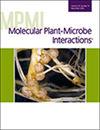Mathilde Hutin, Sara Carpenter, Shivrajani Baruah, Paola Campos, Karine Boyer, Dodelys Andriantsimialona, Solo Hery Rapanarivo, Olivier Pruvost, Nathalie Becker, Lionel Gagnevin, Ralf Koebnik, Boris Szurek, Ousmane Koita, Adam J Bogdanove, Adrien Rieux
求助PDF
{"title":"从水稻细菌性叶斑病病原菌黄单胞菌(Xanthomonas oryzae pv. oryzicola)的历史和现代基因组中了解其进化和流行病学。","authors":"Mathilde Hutin, Sara Carpenter, Shivrajani Baruah, Paola Campos, Karine Boyer, Dodelys Andriantsimialona, Solo Hery Rapanarivo, Olivier Pruvost, Nathalie Becker, Lionel Gagnevin, Ralf Koebnik, Boris Szurek, Ousmane Koita, Adam J Bogdanove, Adrien Rieux","doi":"10.1094/MPMI-05-24-0062-SC","DOIUrl":null,"url":null,"abstract":"<p><p><i>Xanthomonas oryzae</i> pv. <i>oryzicola</i> (<i>Xoc</i>) causes bacterial leaf streak (BLS) of rice. This disease represents a major constraint for rice production, which is a crop feeding more than half of the world's population. <i>Xoc</i> was first described in 1918 in the Philippines and is prevalent in southeast Asia. Today, BLS is also omnipresent in both East- and West-Africa, where the disease was first reported in the early 1980s. The appearance of <i>Xoc</i> in Africa decades after its first report in Asia suggests that the disease could have been introduced from Asia to Africa. Strict conservation of five transcription activator-like (TAL) effectors in whole-genome sequences of 10 strains of <i>Xoc</i> including three from West-Africa and seven from Asia also support this hypothesis. East-Africa, especially Madagascar, where the disease was first described in 1985 is located at the interface between Asia and Africa, hence representing an interesting region to explore the link between strains from Asia and West-Africa. In this study, we did the following: (i) reconstructed the genome of a historical <i>Xoc</i> strain from a herbarium specimen of rice showing symptoms of BLS that was sampled in Madagascar in 1931, 50 years before the first description of the disease, and (ii) sequenced nine new modern strains, including five from Madagascar and East-Africa. The analysis of those new genomes along with previously published ones shed light within the evolutionary and epidemiological history of <i>Xoc</i>. [Formula: see text] Copyright © 2024 The Author(s). This is an open access article distributed under the CC BY-NC-ND 4.0 International license.</p>","PeriodicalId":19009,"journal":{"name":"Molecular Plant-microbe Interactions","volume":" ","pages":"814-818"},"PeriodicalIF":3.4000,"publicationDate":"2024-12-01","publicationTypes":"Journal Article","fieldsOfStudy":null,"isOpenAccess":false,"openAccessPdf":"","citationCount":"0","resultStr":"{\"title\":\"Evolutionary and Epidemiological Insights from Historical and Modern Genomes of <i>Xanthomonas oryzae</i> pv. <i>oryzicola</i>, the Causal Agent of Bacterial Leaf Streak of Rice.\",\"authors\":\"Mathilde Hutin, Sara Carpenter, Shivrajani Baruah, Paola Campos, Karine Boyer, Dodelys Andriantsimialona, Solo Hery Rapanarivo, Olivier Pruvost, Nathalie Becker, Lionel Gagnevin, Ralf Koebnik, Boris Szurek, Ousmane Koita, Adam J Bogdanove, Adrien Rieux\",\"doi\":\"10.1094/MPMI-05-24-0062-SC\",\"DOIUrl\":null,\"url\":null,\"abstract\":\"<p><p><i>Xanthomonas oryzae</i> pv. <i>oryzicola</i> (<i>Xoc</i>) causes bacterial leaf streak (BLS) of rice. This disease represents a major constraint for rice production, which is a crop feeding more than half of the world's population. <i>Xoc</i> was first described in 1918 in the Philippines and is prevalent in southeast Asia. Today, BLS is also omnipresent in both East- and West-Africa, where the disease was first reported in the early 1980s. The appearance of <i>Xoc</i> in Africa decades after its first report in Asia suggests that the disease could have been introduced from Asia to Africa. Strict conservation of five transcription activator-like (TAL) effectors in whole-genome sequences of 10 strains of <i>Xoc</i> including three from West-Africa and seven from Asia also support this hypothesis. East-Africa, especially Madagascar, where the disease was first described in 1985 is located at the interface between Asia and Africa, hence representing an interesting region to explore the link between strains from Asia and West-Africa. In this study, we did the following: (i) reconstructed the genome of a historical <i>Xoc</i> strain from a herbarium specimen of rice showing symptoms of BLS that was sampled in Madagascar in 1931, 50 years before the first description of the disease, and (ii) sequenced nine new modern strains, including five from Madagascar and East-Africa. The analysis of those new genomes along with previously published ones shed light within the evolutionary and epidemiological history of <i>Xoc</i>. [Formula: see text] Copyright © 2024 The Author(s). This is an open access article distributed under the CC BY-NC-ND 4.0 International license.</p>\",\"PeriodicalId\":19009,\"journal\":{\"name\":\"Molecular Plant-microbe Interactions\",\"volume\":\" \",\"pages\":\"814-818\"},\"PeriodicalIF\":3.4000,\"publicationDate\":\"2024-12-01\",\"publicationTypes\":\"Journal Article\",\"fieldsOfStudy\":null,\"isOpenAccess\":false,\"openAccessPdf\":\"\",\"citationCount\":\"0\",\"resultStr\":null,\"platform\":\"Semanticscholar\",\"paperid\":null,\"PeriodicalName\":\"Molecular Plant-microbe Interactions\",\"FirstCategoryId\":\"99\",\"ListUrlMain\":\"https://doi.org/10.1094/MPMI-05-24-0062-SC\",\"RegionNum\":3,\"RegionCategory\":\"生物学\",\"ArticlePicture\":[],\"TitleCN\":null,\"AbstractTextCN\":null,\"PMCID\":null,\"EPubDate\":\"2024/12/18 0:00:00\",\"PubModel\":\"Epub\",\"JCR\":\"Q2\",\"JCRName\":\"BIOCHEMISTRY & MOLECULAR BIOLOGY\",\"Score\":null,\"Total\":0}","platform":"Semanticscholar","paperid":null,"PeriodicalName":"Molecular Plant-microbe Interactions","FirstCategoryId":"99","ListUrlMain":"https://doi.org/10.1094/MPMI-05-24-0062-SC","RegionNum":3,"RegionCategory":"生物学","ArticlePicture":[],"TitleCN":null,"AbstractTextCN":null,"PMCID":null,"EPubDate":"2024/12/18 0:00:00","PubModel":"Epub","JCR":"Q2","JCRName":"BIOCHEMISTRY & MOLECULAR BIOLOGY","Score":null,"Total":0}
引用次数: 0
引用
批量引用

 求助内容:
求助内容: 应助结果提醒方式:
应助结果提醒方式:


